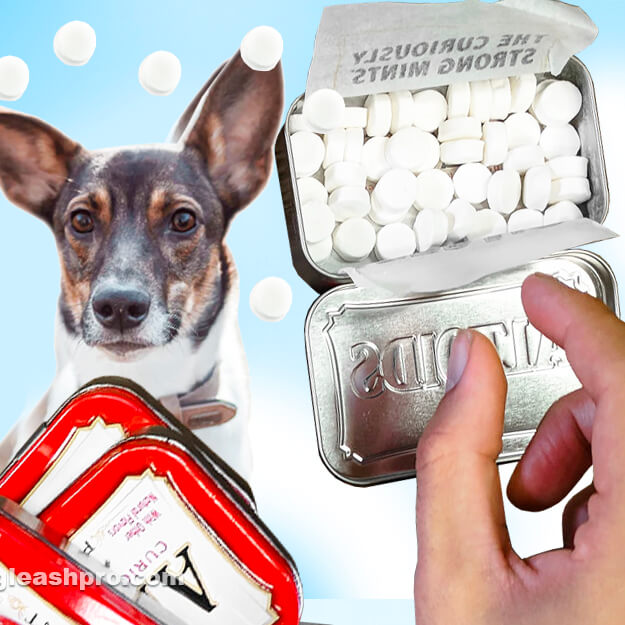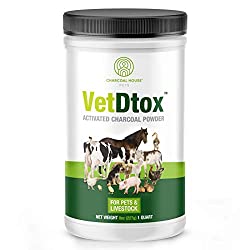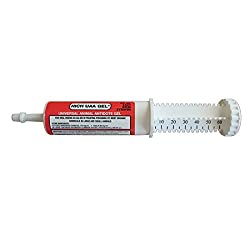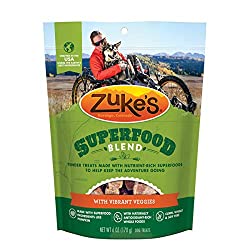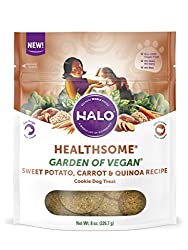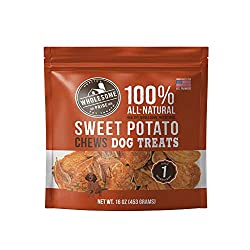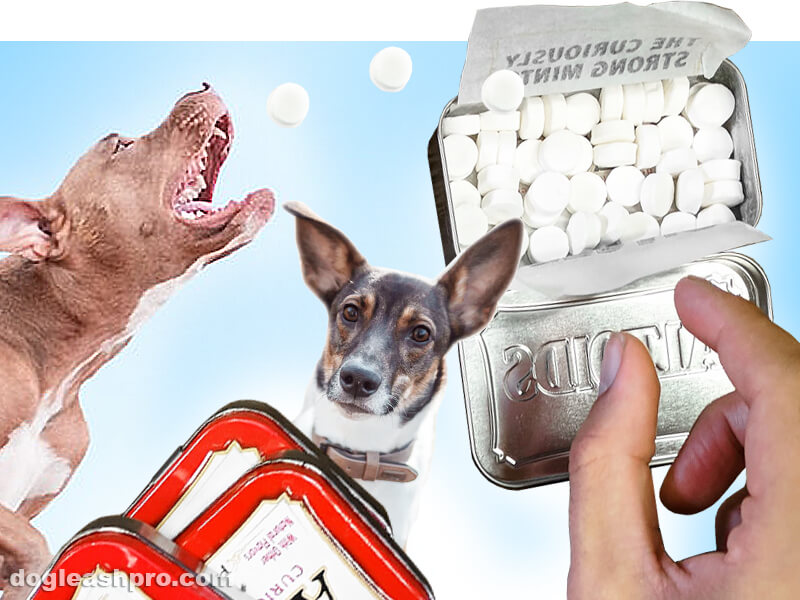
No, dogs can not eat Altoids. Altoids are loaded with artificial ingredients that are unfit for doggy consumption. Ingredients that seem harmless to humans can be dangerous for our dogs. Besides, while Altoids freshen up our breath, they don’t work on dogs. So there’s really no reason for you to feed your dog these minty candies.
Instead, if your pup wants something crunchy to munch on, it’s best to go with seeds like sunflower seeds or pumpkin seeds. Not only are they tasty but also healthy for our canines.
Table of Contents
What are Altoids?
Altoids are a brand of minty candies that are widely used as a breath freshener. They are known for their strong peppermint flavor and signature tin packaging.
Altoids originated from England and came to America during the 20th century. These days, Altoids sold in America are made locally by Mars.
Ingredients in Altoids
Altoids contain sugar, corn syrup, gelatin, gum Arabic, artificial coloring, and several other artificial and natural flavors such as peppermint and spearmint oil. Sugar-free Altoids substitute sugar and corn syrup for sorbitol and sucralose.
Hint: When it comes to feeding your dog, check the food’s ingredients and be cautious with how much sugar it contains. It’s always best to avoid feeding our pooch food that is loaded with sugar as it can cause weight gain and obesity in dogs.
How is Altoids made?
Although the exact method of making Altoids is an industry secret, the process is similar to how all mints are made.
First, sugar, mint oil, and gelatin are mixed with a binding agent and fed into a mixer. While the mixer mashes the ingredients together, different color pigments are blended to form the desired shade and added to the mix.
The mixture is then pressed into a sheet and sent to a cutter that shapes it into tiny pills. As the pills dry, they harden and get sent for packaging.
Are Altoids bad for dogs?
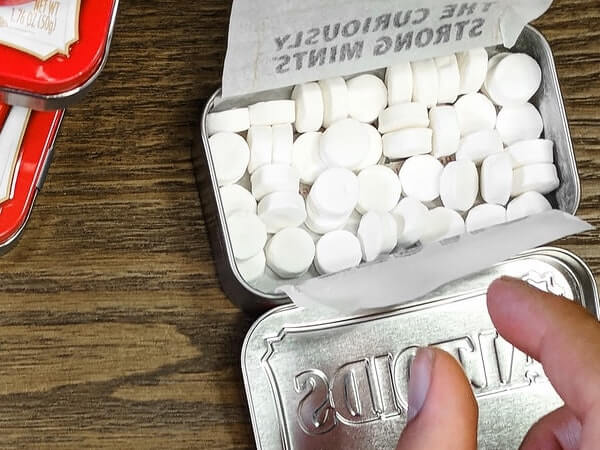
Altoids are sugary candies and anything that contains this much sugar should be kept away from our furry friends. Besides, Altoids also have many other ingredients that aren’t fit for our pup’s digestive system. To get a better understanding, let’s look at some prominent ingredients in Altoids and how they can affect dogs.
1. Sugar
There is no need for dogs to consume sugar. It contains little nutritional value and is a known culprit behind numerous health issues in our canine companions. Sugar is also highly addictive, meaning once your pup gets hooked, they’ll crave sugary treats all the time.
Regular Altoids are full of sugar. Feeding sugary treats to your pooch frequently can lead to:
- Stomach soreness.
- Stomach inflammation.
- Loss of appetite.
- Tooth decay.
- Obesity.
- Hormone imbalance.
- Diabetes.
2. Corn syrup
Corn syrup is a sweetener that is artificial and more addictive than sugar. It can be found in Wintergreen Altoids. Like sugar, excessive corn syrup consumption can lead to:
- Upset stomach or Stomachaches.
- Blood-sugar imbalance.
- Dehydration.
- Obesity.
- Diabetes.
3. Sorbitol and Sucralose
In sugar-free Altoids, artificial sweeteners like Sorbitol and Sucralose replace sugar and corn syrup. While these artificial sweeteners are not toxic, they aren’t suitable for canine bellies either.
Sorbitol and sucralose are harmless in small quantities. But sugar-free Altoids are chock-full of these sweeteners. If your puppy overdoses on sugar-free Altoids, you may observe the following symptoms:
- Runny or loose stool.
- Irritable Bowel Syndrome.
- Flatulence.
4. Mint oil
Altoids get their strong minty flavor from peppermint and spearmint oils and mint extracts. Mint is toxic to dogs. Naturally, a candy with such a bold minty taste is laced with mint oil.
Dogs that ingest peppermint or spearmint oil may experience:
- Diarrhea.
- Lethargy.
- Vomiting.
- Skin irritation.
- Irritation in the mouth.
- Mint poisoning.
5. Artificial and natural flavoring
Altoids also contain other substances under the moniker of “natural and artificial flavoring.” The exact ingredients are purposely hidden to keep the recipe a secret. Although they’re safe for human consumption, there is no telling if those ingredients are suitable for our furry companions.
When shouldn’t you feed Altoids to your dog?
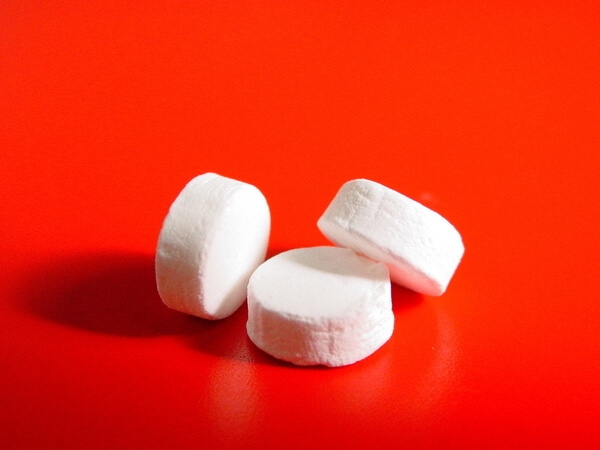
While you may pop an Altoids mint or two to freshen up your breath, they don’t work for dogs. Altoids will only cause your pup discomfort and irritation.
Dogs that are old, obese, or diabetic shouldn’t eat anything too sweet. Considering that Altoids are rich in artificial and processed sugars, they can cause a sugar imbalance in your pup’s body.
Feeding your pooch one or two mints is fine. But if you notice them getting addicted to sweets, you need to stop. Sugar can be very addictive, and your pup may start craving Altoids, not knowing that they’re bad for them.
Altoids provides no nutritional benefit for dogs
Altoids provide little to no nutritional value to dogs. Their stomachs aren’t designed to process these minty pills properly. Eating too many Altoids will give them indigestion, elevated blood sugar, and possible mint poisoning.
What if my dog accidentally eats a lot of Altoids?
Some Altoids don’t contain Xylitol, a sugar alternative that is poisonous for dogs. If your pooch eats a couple of non-xylitol Altoids, that’s not a cause for worry. If they’ve consumed a bunch, though, then you need to be on high alert.
If your pup has eaten too many Altoids, the most critical thing to look out for is mint poisoning. Peppermint and spearmint oils that give Altoids their signature strong flavor are toxic to dogs. Take your pup to the vet immediately if they’ve ingested too many Altoids.
Expect vomiting and diarrhea—that’s just the dog’s natural defense system trying to expel the toxins. Your pooch may also experience irritation in and around the mouth.
You should also find the box or wrapper of the Altoids your doggy ate. It’ll help the vet determine the correct treatment for your dog.
Symptoms to Watch For
As we’ve mentioned above, a dog that has eaten a load of Altoids is at risk of mint poisoning. Peppermint and spearmint, along with other ingredients like menthol give Altoids their bold flavor. These ingredients are toxic to dogs. You should observe if your pooch shows symptoms of mint poisoning. These include:
- Lethargy. The dog will lose their energy and seem drained. He may be slow to respond or may not respond at all.
- Vomiting. Vomiting is the natural defense of the dog’s gut for expelling any unwanted ingredient from the system. It is a good sign, but it can be exhausting.
- Diarrhea. Runny stool is another sign that something has upset the dog’s stomach. Give your four-legged friend plenty of water to drink, as diarrhea can cause dehydration.
Treatments if your dog has Altoids poisoning
If the dog has ingested a large amount of Altoids, they need to visit the vet immediately.
The vet may need to run several tests to diagnose the core problem behind your pup’s condition. However, if you provide them the wrapper or box of Altoids your canine just ate, it will help the vet figure out the best treatment immediately.
Mint poisoning may sometimes warrant fluid therapy. This treatment rids the dog’s digestive system of the toxin. Your pooch may also be given vitamins to boost its immunity.
Activated charcoal is a known toxin absorber. Activated charcoal therapy neutralizes toxins and keeps them from being dissolved in the dog’s digestive system.
Dog-friendly and healthy alternatives to Altoids
Strong mint candies like Altoids don’t work for dogs the way they do for us. If your pup’s breath is giving you a headache, there are plenty of non-toxic, canine-friendly alternatives to Altoids. These healthy breath fresheners can make the bad breath go away while keeping the dog’s belly happy:
- Apples: Fresh fruits like apples can clean up your dog’s teeth and keep their oral hygiene in top form. Remove the skin and core of the apple and cut it into slices to make it easy to eat.
- Carrots: Carrots work just like apples by removing the plaque build-up on your dog’s teeth. They’re not only tasty but are also rich in essential vitamins.
- Apple cider vinegar: Adding half a teaspoon of apple cider vinegar to your dog’s food can ensure your four-legged friend doesn’t get foul breath after eating.
- Coconut oil: Not only is coconut oil good for your dog’s coat, but it can also keep your dog’s teeth healthy. You can add it to your dog’s food or rub it on their teeth, and it will help keep their breath fresh.
- Curly leaf parsley: Parsley provides essential antioxidants, vitamins, and minerals. It improves vision, digestion, organ health, and immunity. This superfood is also an excellent breath freshener. Add a small amount of it to your dog’s food or water bowl.
- Brushing: Regular brushing is as important for canines as it is for humans. It rids the teeth of any leftover food, which would otherwise rot and cause bad breath. Make it a habit to brush your dog’s teeth a few times a week.
Whenever I find myself popping a few Altoids, my Labrador sitting beside me gets curious and starts to drool. Instead of giving her the Altoids, I give her the following dog treats that are delicious, safe, and healthy for her.
How to freshen your dog’s breath canine-friendly way
If your pup’s bad breath is bothering you, feeding them Altoids won’t do any good. They won’t freshen your dog’s breath and will only irritate them.
Alternatives like carrots, apples, and parsley can instantly freshen up your dog’s stinky mouth. Plus, they’re nutritious and non-toxic.
Like humans, regular brushing is vital for your dog’s oral health. Dog-friendly brushes and toothpaste are readily available. Brushing should be a regular part of your dog’s routine.
If your dog’s mouth still stinks despite regular oral care, they may have some underlying dental or stomach issues. Schedule a checkup with your vet to get your dog’s teeth and belly checked.
So, can dogs eat Altoids?
Altoids serve no nutritional value to your furry friend. They are loaded with artificial flavors, colors, and sugars which can cause obesity, diabetes, and indigestion. Considering all that, keep Altoids as far away from your pooch as possible.
Related Questions
Wintergreen Altoids contain corn syrup on top of the sugar. Corn syrup is sweet, addictive, and bad for your dog’s blood sugar level. While they’re not toxic, the high sugar content in Wintergreen Altoids makes them unhealthy for canines and can cause diabetes in dogs.
Cinnamon is non-toxic to dogs. However, that doesn’t mean Cinnamon Altoids are any less harmful for your pup. They’re rich in sugar, artificial flavors, and colors, making them an unhealthy snacking option for your pup.
Peppermint Altoids get their flavor from peppermint oil. This substance is toxic to dogs and can lead to indigestion, irritation, and vomiting. They’re also loaded with sugar and artificial flavors, which makes things worse.
Like their peppermint variety, spearmint Altoids get their flavor from spearmint oil. This mint extract is toxic to dogs and can be very irritating if ingested. Consuming spearmint Altoids in excess may lead to stomach and mouth irritation in dogs.
DISCLAIMER: THIS WEBSITE DOES NOT PROVIDE MEDICAL ADVICE
The information, including but not limited to, text, graphics, images and other material contained on this website are for informational purposes only. No material on this site is intended to be a substitute for professional veterinary advice, diagnosis, or treatment. Always seek the advice of your veterinarian or other qualified health care provider with any questions you may have regarding dietary needs.
Resources:
https://en.wikipedia.org/wiki/Altoids

With over five years of specialized experience as an animal writer, my expertise lies in dog nutrition, health, behavior, grooming, and training. I am dedicated to delivering helpful and informative content that caters to the well-being of our furry friends. My primary goal is to empower pet owners with knowledge and ensure our canine companions thrive in health and happiness. In my free time, I love volunteering at local dog rescue centers.
